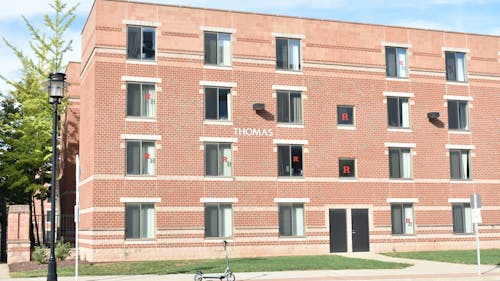FUCHS: First-year students should not be afraid of their residence assistant
Column: Questioning Jules

Back many years ago when I was a first-year student, I remember at first being intimidated by my residence assistant (RA). She was very friendly and welcoming, though, so overall I felt comfortable with her. Despite this comfort, there were some things that I needed advice about that I was not sure whether I could ask her about. I was nervous to bring up issues I had with other people on the floor and personal problems especially.
I tried my best to keep a distant relationship with her and did not open up about the first-year student struggles I was experiencing such as homesickness, trouble making friends and time management. Now as a senior and a RA in first-year halls, I am here to tell you that you should not be afraid of your RA!
One common misconception regarding RAs is that we are only here to enforce policy and look for trouble. That cannot be further from the truth. Yes, it is true that we do care about the policies and enforce them, but a lot of the rules go without saying: no underage drinking, no loud noises during quiet hours, no hall sports and now we must wear masks in the residence halls.
These are all common rules that do not necessarily apply only to college residence halls. In fact, many of the policies would be enforced in an apartment building or condominium. These rules are set in place to make everyone’s living situation as ideal as possible and to keep everyone safe. The rules are not difficult to follow and should really not be an issue.
RAs are trained to enforce and educate residents about policies, that is true. But, a part of our training that is more than often overlooked is the part where we are also available to talk to residents about personal issues.
We are mandated reporters. Anything that is said in a private conversation can potentially be reported to residence life if it involves any serious concerns or policy violations. This does not mean, though, that RAs are not able to have discussions with their residents. Oftentimes, we can even help by offering a new perspective on an issue or a struggle you face.
As an RA, my absolute favorite story from this year involves helping two of my female residents. Both of them came to me with concerns about making friends and adjusting to college life. They had both come to me on separate occasions and had different situations that preceded their concerns.
I am so glad that I was able to help them out by actually suggesting that they reach out to each other and become friends. Recently, I found out that they are very close friends and both girls now feel more at home in the residence halls. While things might not always work out that perfectly in all situations, there are still other ways in which an RA may be able to help you feel more at home.
It is understandable that a lot of first-year students might not feel comfortable talking to their RA. Some may feel that they are a burden by coming to them with their personal problems or asking for advice about school related issues. It is important to remember that your RA was hired and accepted the position they are currently in for a reason.
People who choose to become RAs and are eventually given the job are typically people who help mediate conflict and bring a positive attitude to the residence hall.
Although your RA may have had to speak to you about serious issues or report a policy violation at some point, it is not personal and does not mean the RA has resentment toward you. Everything the RA does is to keep residents happy and safe, and this includes reporting incidents that occur.
Going to talk to your RA privately, in my opinion at least, is a lot like talking to a professor during office hours. During floor meetings and in everyday encounters the RA may seem to only be concerned about policy enforcement, as professors may seem to be intimidating in class.
Once you have a one-on-one meeting with your RA you will find that they are very understanding and most importantly are students just like you who have had very similar experiences.
Julia Fuchs is a School of Arts and Sciences senior majoring in history and anthropology and minoring in French and archaeology. Her column, "Questioning Jules," runs on alternate Wednesdays.
*Columns, cartoons and letters do not necessarily reflect the views of the Targum Publishing Company or its staff.
YOUR VOICE | The Daily Targum welcomes submissions from all readers. Due to space limitations in our print newspaper, letters to the editor must not exceed 900 words. Guest columns and commentaries must be between 700 and 900 words. All authors must include their name, phone number, class year and college affiliation or department to be considered for publication. Please submit via email to oped@dailytargum.com by 4 p.m. to be considered for the following day’s publication. Columns, cartoons and letters do not necessarily reflect the views of the Targum Publishing Company or its staff.



